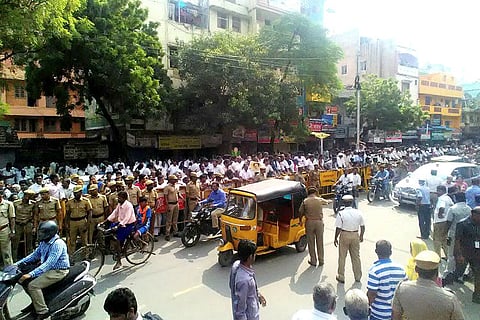

If there were any doubts about the power of social media, they should have been cleared by Sunday night’s events surrounding the cardiac arrest that Tamil Nadu Chief Minister J Jayalalithaa suffered earlier in the day.
To begin with, it was the buzz on social media about Jayalalithaa’s condition through late afternoon that resulted in streams of AIADMK cadres pouring into Greames Lane, where Apollo Hospitals in located.
This is what probably forced the hospital authorities to issue a statement on the CM’s health condition.
And Apollo Hospitals went one step ahead. For probably the first time, a hospital took to social media to disseminate information about the condition of one of its high profile patients.
The Hon'ble Chief Minister of Tamilnadu who is undergoing treatment at Apollo Hospitals,Greams Road, suffered a cardiac arrest this evening.
— Apollo Hospitals (@HospitalsApollo) December 4, 2016
She is on extracorporeal membrane heart assist device and is being treated by a team of expert doctors and critical care specialists.
— Apollo Hospitals (@HospitalsApollo) December 4, 2016
Dr Richard Beale from London has also been consulted and he has concurred with the line of treatment by our cardiologists & pulmonologists.
— Apollo Hospitals (@HospitalsApollo) December 4, 2016
The Hon'ble CM is the beloved leader of the masses. Please join us in praying for her speedy recovery. #GodblessAmma #Jayalalithaa
— Apollo Hospitals (@HospitalsApollo) December 4, 2016
And not just update on her condition, Apollo also indicated how critical Jayalalithaa was by urging people to pray for her.
Our prayers are with her and we hope she will recover soon. We request all of you to pray for her good health and well being. #GodblessAmma
— Apollo Hospitals (@HospitalsApollo) December 4, 2016
She is an amazing leader of the masses.
— Sangita Reddy (@SangitaApollo) December 4, 2016
While this did help the media, and through them the public, to have a clearer picture of her condition, it did not prevent the social media from going berserk.
And unfortunately, the media also lapped up some of these forwards of unknown origins and parroted them as gospel truth.
I was in particular aghast when anchors and reporters of many television channels announced that a holiday had been declared for schools and colleges “under Madras University and Anna University”.
That some channels swallowed this WhatsApp forward that was doing the rounds on Sunday night, brought once again into focus how social media can be misused.
Some journalists, sitting in newsrooms of television channels, as well as some of the reporters on the field (outside Apollo Hospitals), seemed to have suspended their common sense in accepting this forward as gospel truth without any verification.
The reporter of one channel even quoted from this WhatsApp forward to “confirm” the news. The DEO has issued a statement, the reporter said.
Common sense should have told the reporter on the ground that Tamil Nadu has a board of secondary education and has a director, but that board is only concerned with the conduct of examinations. A cursory check on the website quoted- ww.DEO.tn.com- would also have told them, and their Delhi-based anchors, that the information is fake.
But I was shocked when one of the journalists concerned dismissed it as a possible crashing of the website due to heavy traffic.
Clearly, journalists should have had the common sense to know that all government departments are on either gov.in or nic.in, and none of them are on dot com.
The only saving grace was when one of the channels asked one of its guests, senior journalist RK Radhakrishnan, about the reports concerning closure of schools. Radhakrishan did his best to shoot these reports down by explaining the process of how government goes about announcing closure of schools and colleges, and how this had not been the case on Sunday.
With social media playing a major role as source of news for the media, it is imperative that newsrooms across the country, especially the “Breaking News” TV channels, put their journalists through a crash course in social media sourcing and social media verification.
Till then viewers will be subjected to such bilge.